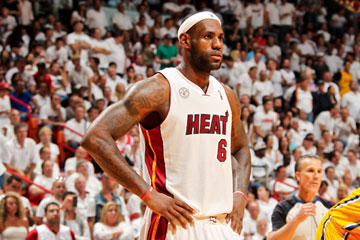
LeBron James of the Miami Heat looks on while playing against the Indiana Pacers in Game Seven of the Eastern Conference Finals during the 2013 NBA Playoffs on June 3, 2013.
Lebron James is a genius. you may be thinking that "genius athlete" is some kind of contradiction. Suggesting that athletes are as cerebral as physicists solving cosmic mysteries or as creative as modern-day Mozarts seems like a stretch. LeBron James is LeBron James because he's a chiseled, large, freakishly fast specimen who has mastered the fundamental skills of basketball: dribbling, shooting and passing. Big muscles require no genius. Let's reserve that term for the brainiacs.
Wrong. Athletes must process multiple streams of information in real time under extreme pressure. While a mathematician puzzles out a groundbreaking proof, 300-lb. linemen aren't chasing him around his office, trying to crush his chalkboard. Where's my defender? Where are my teammates' defenders? Go left or right? Pass or shoot? "A good hockey player plays where the puck is," the Great One, Wayne Gretzky, once said. "A great hockey player plays where the puck is going to be."
In the overall genius pecking order, James, whose Miami Heat face the San Antonio Spurs in the NBA Finals, is no Einstein. Einstein, however, was no LeBron. "Why look at the brain as better than the body? Why look at the body as better than the brain?" says John Krakauer, professor of neurology and neuroscience at Johns Hopkins University School of Medicine and a co-author of the 2009 paper "Inside the Brain of an Elite Athlete: The Neural Processes That Support High Achievement in Sport," published in Nature Reviews Neuroscience. "It's all just matter. There's this cultural addiction to singling out the cognitive. To say Einstein is a more evolved genius than LeBron James is some sort of nonsense."
This season, James won his fourth MVP award, ranking him with legends Kareem Abdul-Jabbar, Michael Jordan, Bill Russell and Wilt Chamberlain. "He's brilliant, really," says Duke coach Mike Krzyzewski, who coached James during the 2008 and 2012 Olympics--both gold-medal years for the U.S. men's basketball team. "In a meeting I can go through, say, five sets that Spain runs on a chalkboard or on tape. When we go to the court and start walking through trying to learn it in real time, he already knows them. And not only does he know them, he had already thought about his reactionary moves to their movement."
His intelligence is on constant display. It's in the dunks, the fallaway shots, the ability to smother and outsmart opponents on defense--he finished second in the vote for Defensive Player of the Year this season--the spinning layups in the post. And then there are the passes he dishes out like a Vegas card dealer: whoosh, a crosscourt fastball to you, Ray Allen, for a corner three-pointer; flick, a shovel pass to you, Shane Battier, for another open shot. It's in his embrace of basketball analytics. James, who went directly to the NBA from high school, studies the numbers to see the spots on the floor where he has the best chance of scoring and his opponents are least effective. It's in the fact that he's still only 28 years old and will continue to push his game to new limits. "If he stays healthy," says ESPN analyst Hubie Brown, a former NBA head coach, "he will probably go down as the greatest player to ever play." Greatest genius, actually.
